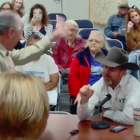Alcohol
Deaths due to drinking rose sharply in 2021
|
More than 2,200 New Mexicans died of alcohol-related causes in 2021, according to new estimates from the Department of Health, capping a decade in which such fatalities nearly doubled and setting a new high-water mark in a state already beset by the worst drinking crisis in the nation. The updated data arrive as lawmakers draft legislation to reduce alcohol’s harms for the upcoming session.
Laura Tomedi, an assistant professor at the University of New Mexico College of Population Health, drew on the data at a late-November hearing of the interim Legislative Health and Human Services Committee. Tomedi, who from 2013 to 2018 led the health department’s substance abuse epidemiology section and served as its alcohol epidemiologist, told lawmakers the state’s death rate had been “going up and up and up” for years. But she described the latest trends — a 17% uptick in 2020 and another 13% jump in 2021 — as a “concerning, sharp increase.”
This spike in deaths coincided with the pandemic, she said, when “early indications are showing that alcohol use increased quite a bit.”
The mortality data, which are the most comprehensive estimates of alcohol’s full impact on New Mexicans’ health, account for all causes of death brought on by drinking including injuries in motor-vehicle crashes and violence in which the victim was intoxicated, and illnesses such as liver disease and cancer. Illness deaths due to chronic drinking made up a growing share of alcohol-attributable deaths, accounting for 62% in 2021, compared to 38% resulting from acute intoxication such as injuries and poisonings.









